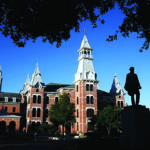WASHINGTON (RNS)—Jason Ford, 29, of Murfreesboro, Tenn., plans to spend Election Day at home this year.
A self-identified evangelical Christian, Ford cast his vote for President Bush in 2004 but said he and his wife plan to stay away from the polls Nov. 4, rather than vote for Sen. John McCain.
“I’m not going to be able to vote for anyone who doesn’t take a 100-percent stand against abortion,” said Ford. “So right now, I’m in a dilemma.”
Ford is concerned by McCain’s support for embryonic stem cell research.
“If he’s OK with that, then I’m not,” Ford said.
|
Young evangelicals Chris Haw (left) and Shane Claiborne led a “Jesus for President” tour this summer to encourage Christians to base their votes on values rather than partisan agendas.
|
Ford is not alone. Focus on the Family founder James Dobson, a leading conservative Christian voice, publicly vowed in February never to support McCain. He softened his stance recently—particularly after McCain announced his choice for a running mate, Gov. Sarah Palin of Alaska.
Palin, a 44-year-old evangelical Christian, has been held up as a model of pro-life family values for her decision to give birth to her fifth child in April after learning he has Down syndrome.
Dobson called Palin “an outstanding choice that should be extremely reassuring to the conservative base” of the Republican Party.
Richard Land, president of the Southern Baptist Ethics & Religious Liberty Commission, said Palin resonates with evangelicals: “She’s one of us.”
Sign up for our weekly edition and get all our headlines in your inbox on Thursdays
Still, some conservative evangelicals remain less than enthusiastic about their options this fall. And conscientious abstention raises another ethical question: Do Christians have an obligation to vote?
Of the multitude of Christian denominations in the United States, few have a history of deliberate non-voting. Jehovah’s Witnesses, who demand full separation of church and state, may be the largest and most prominent example, along with some Anabaptist sects, such as the Hutterite Brethren.
Among evangelicals, Catholics and mainline Protestants, where civil participation is encouraged, debate centers on voting itself, a hard-won freedom that some say makes it a rite as well as a right.
Martin Marty, a professor emeritus at the University of Chicago Divinity School, believes the obligation to vote can be traced back to biblical times.
“I think most churches would say there’s a great moral suasion behind it,” Marty said. “In Christianity, for example, as nervous as they might be about any particular civil order, the New Testament does say government was created by God. Most churches would say: ‘Yes, get out Tuesday; get out and vote.’”
Brian McLaren, a progressive evangelical leader, echoed Marty’s assertion, arguing that politics—and life—is a compromise between the lesser of two evils, or as he puts it, “the better of two less-than-perfects.”
Asked about the ethics of voting, former Arkansas governor and Republican presidential candidate Mike Huckabee quoted the Gospel of Matthew: “Render unto God the thing’s that are God’s, and render unto Caesar the things that are Caesar’s.”
“Part of being a citizen in a society like ours, where we have the privilege of voting, is the responsibility to exercise that privilege,” Huckabee said. “To not do so is to sort of forego that part of what it means to be in a free society, and I think it would be unfortunate.”
Still, dissenters say there are reasons for staying home.
Todd Whitmore, a professor of theology at the University of Notre Dame and a contributor to the new book, Electing Not To Vote, argues that while Christians are obligated to participate in civil society, the electoral system has been reconfigured to the point where voting is not always an appropriate or efficient means of participation.
“If you don’t allow for situations like (abstaining), then you basically make the earthly political order into a kind of God. The earthly political order is a good,” Whitmore said. “But it’s not the ultimate good.”
The motive behind not voting can be as significant as the act itself. A supporter of Sen. Hillary Clinton would not be justified in staying home rather than support Obama, according to Whitmore, because that would be “a kind of political blackmail” rather than a moral stand.
Shane Claiborne, a young evangelical leader of the “emergent church” movement, offers a counter-culture antidote to the get-out-the-vote drives that fuel America’s civil religion. Claiborne, along with his friend Chris Haw, embarked on a nationwide “Jesus for President” tour this summer, reminding Christians that their primary allegiance is not to a partisan agenda, but to Jesus and his teachings.
Regardless of the merits of voting or not voting, however, conscientious abstainers make up just a small fraction of the electorate. According to John C. Green, a senior fellow at the Pew Forum on Religion & Public Life, there is no historical precedent for large groups of religious voters deliberately staying home, and little evidence to suggest that will change in the fall.
“I think the bigger problem is not so much that folks abstain out of principle or to punish their party, but they just don’t have the same level of enthusiasm,” Green said. “Lots of people, whether they’re religious or not, need a lot of stimulus to get out and vote.”














We seek to connect God’s story and God’s people around the world. To learn more about God’s story, click here.
Send comments and feedback to Eric Black, our editor. For comments to be published, please specify “letter to the editor.” Maximum length for publication is 300 words.